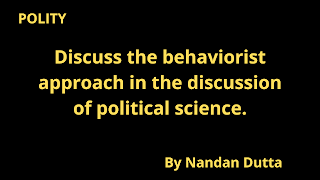Behaviorist approach in the discussion of political science.
Discuss the behaviorist approach in the discussion of political science.
What is behaviorism? Write down its features and limitations.
Meaning and Concept of Behaviorism: -
There are limitations to the traditional approach to the discussion of political science. Behaviorism emerged in the first half of the twentieth century. Behaviorism is basically an attempt to explain politics through observation and to make the subject of political science scientific with the help of psychology, sociology, economics, anthropology etc. The ultimate goal of behaviorism is to analyze the political process in a scientific way.
Robert A Dahl describes behaviorism as a protest movement in political science.
Arnold Brecht called behaviorism an attempt to build an empirical and perpetual theory of political life.
Characteristics of Behaviorism: -
1. Behavioral statesmen accept the behavior of individuals and social groups as the unit or goal of theoretical and empirical analysis, rather than events, structures, institutions, and ideologies.
2. Behaviorism tends to extend the boundaries of political theory and research to socio-psychological and cultural anthropology.
3. Political behaviorism places special emphasis on the interdependence of theory and research. Behaviorism does not deal with mere phenomena like the descriptive empiricism of the past; Self-consciously it is theoretical.
4. Behavioral political scientists consider any action related to the exercise of power to be a political act and are inclined to include it in the agenda of political science.
5. The real purpose of behaviorists is to form a coherent empirical political theory. They focus on events rather than value. Behaviorists tend to make their discussions value neutral.
6. Behavioral political scientists focus on establishing relationships with different branches of social sciences. According to them, it is not possible to fully understand the social and political role of a person without connecting with different branches of social sciences.
7. Behavioral political scientists focus on the analysis of political issues. They analyze political problems using scientific methods.
Criticism / Limitations of Behaviorism: -
1. Behavioral political scientists have not been able to agree on a universal definition of politics. Traditional political scientists have complained that the definition of politics cannot be determined by human behavior alone.
2. One of the criticisms of behaviorism is that behaviorism is a nomenclature of numerology. This is because behaviorism places more importance on numerology in the discussion of political science.
3. Behaviorism denies values. Behaviorists are therefore accused of using only information, lists, and diagrams in their political analysis - only with that, a proper analysis of political life is not possible.
4. Many criticize behaviorism as a conservative doctrine; Because behaviorism favors maintaining the stability of bourgeois society. Behaviorism never discusses social change, state revolution, social change.
5. Behaviorists have blindly imitated the laws of the natural sciences in their analysis of human political life. The use of natural sciences in the analysis of human society and political life is in many cases irrational.
6. Many complain that while behaviorists tend to make their discussions value neutral, in reality it is not value neutral. Because, behaviorists present political statements considering US democracy as the appropriate political system.
7. Behaviorism has made the discussion of political science more dependent on different branches of sociology. As a result, many critics feel that the behaviorists have undermined the basic features of political science.
In conclusion, the behaviorist movement did not last long due to the various limitations mentioned above. However, the behaviorist movement was followed by the post-behaviorist movement, which sought to reconcile the traditional view with the behaviorist view.


0 comments